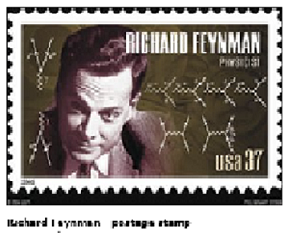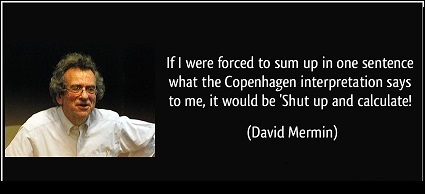0.1: Preface, 1.0.: My answer to Feynman's question
This is the lecture note for graduate students.
This lecture has been continued, with gradually improvement, for about 15 years in the faculty of science and technology of Keio university.
In this lecture, I explain
"quantum language"(="measurement theory")
, which was proposed as
by myself.
Quantum language is a language that is inspired by the Copenhagen interpretation of quantum mechanics, but it has a great power to describe classical systems as well as quantum systems. In this lecture, I assert that quantum language, roughly speaking, has the three aspects as follows.
| $\bullet$ | the standard interpretation of quantum mechanics(i.e., the true colors of the Copenhagen interpretation) |
| $\bullet$ | the final goal of the dualistic idealism (Descartes=Kant philosophy) |
| $\bullet$ | theoretical statistics of the future |
 1.0.: My answer to Feynman's question
1.0.: My answer to Feynman's question
Dr. R. P. Feynman (one of the founders of quantum electrodynamics) said the following wise words: \( ( \sharp_1 ) \) and \( ( \sharp_2 ) \).
| \( (\sharp_1) \): | There was a time when the newspapers said that only twelve men understood the theory of relativity. I do not believe there ever was such a time. There might have been a time when only one man did, because he was the only guy who caught on, before he wrote his paper. But after people read the paper a lot of people understood the theory of relativity in some way or other, certainly more than twelve. On the other hand, I think I can safely say that nobody understands quantum mechanics. |
| $(\sharp_2)$: | We have always had a great deal of difficulty understanding the world view that quantum mechanics represents.$\cdots \cdots$ I cannot define the real problem, therefore I suspect there's no real problem, but I'm not sure there's no real problem. |

| $(\flat)$: | I am sure there's no real problem. Therefore, since there is no problem that should be understood, it is a matter of course that nobody understands quantum mechanics. That is, since there's no problem, what we can do is only
|
This answer may not be uniquely determined, however, I am convinced that the above ($\flat$) is one of the best answers to Feynman's question ($\sharp_1$) and ($\sharp_2$).
The purpose of this lecture is to explain the answer ($\flat$). That is, I show:
If the reader knows quantum mechanics a little, it may be recommended to read the following references (before reading the blog):
| [1]: | S. Ishikawa, “A New Interpretation of Quantum Mechanics,Journal of Quantum Information Science,” Vol. 1 No. 2, 2011, pp. 35-42. doi: 10.4236/jqis.2011.12005 ( download free) |
| [2]: | S. Ishikawa, “ Quantum Mechanics and the Philosophy of Language: Reconsideration of Traditional Philosophies," Journal of quantum information science, Vol. 2, No. 1, 2012, pp.2-9.doi: 10.4236/jqis.2012.21002 ( download free) |
| [3]: | S. Ishikawa, “The linguistic interpretation of quantum mechanics,”arXiv:1204.3892v1[physics.hist-ph], (2012) ( download free) |
| [4]: | S. Ishikawa, “Linguistic interpretation of quantum mechanics; Projection Postulate” Journal of Quantum Information Science, Vol. 5 No. 4, 2015, pp. 150-155. DOI: 10.4236/jqis.2015.54017 ( download free) |
